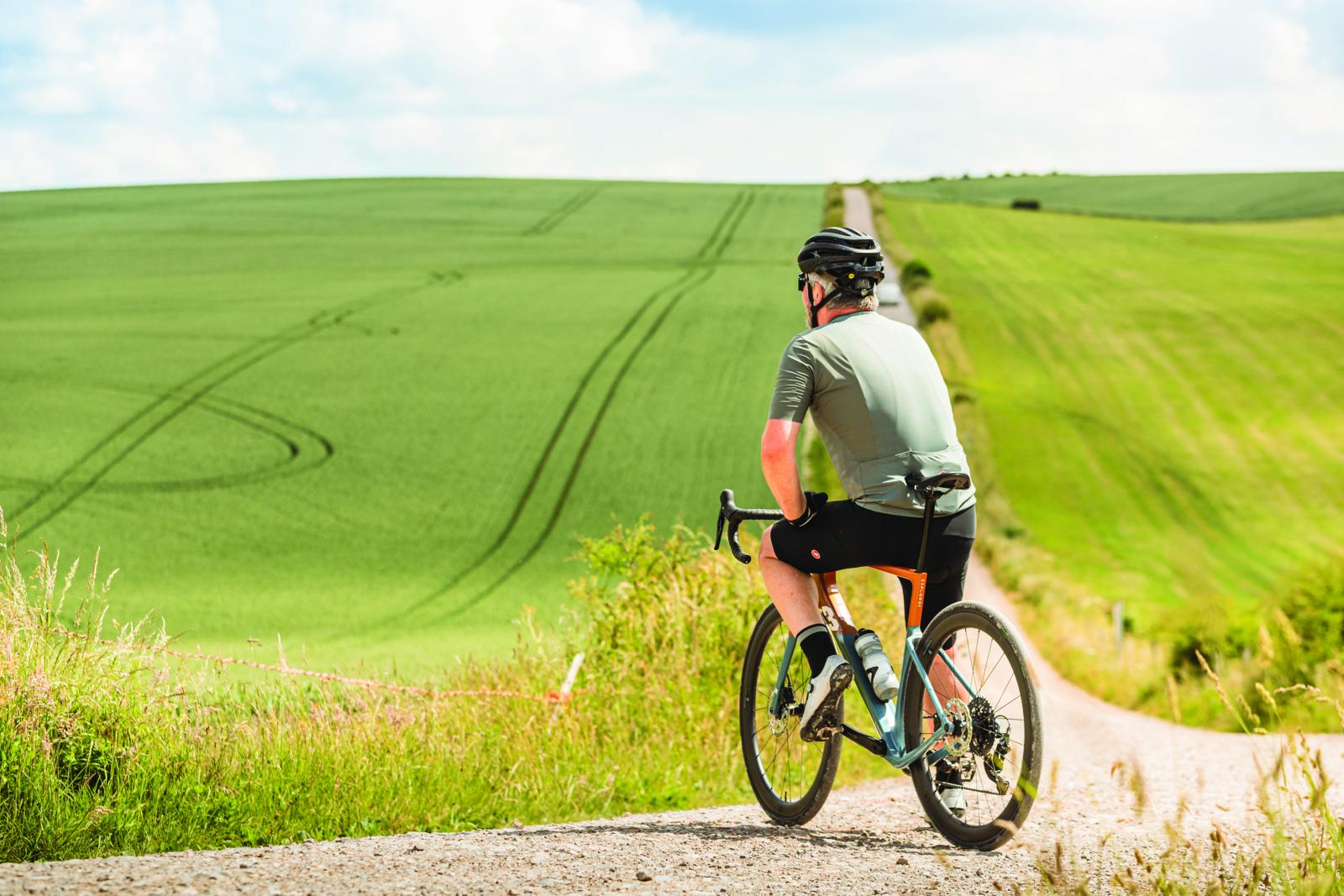The latest Orbea Terra is designed to be all the gravel bike you’ll ever need, no matter what sort of gravel you ride.
Orbea got into the gravel bikes game early. The original 2017 Terra was based on the brand's Avant endurance bike, albeit with bigger tyre clearances, a slacker head angle and a longer wheelbase.
The new Terra ups the ante with a revised geometry to make it nimbler when the going gets rough and the platform more versatile.
The Terra can be equipped with a mechanical or electronic drivetrain across both 1x and 2x formats. It can be run with 700c or 650b wheels (with 45mm-wide clearance in 700c and a huge 50mm in 650b).
The Terra carbon frameset is available on bikes from £3,199 up to this flagship model at £5,358, which can all be heavily personalised and modified using Orbea’s MyO system.
In this range-topping spec, I’ve come away mightily impressed – it delivers one of the best all-round gravel rides of any bike.
Orbea Terra M21e Team 1X frame details
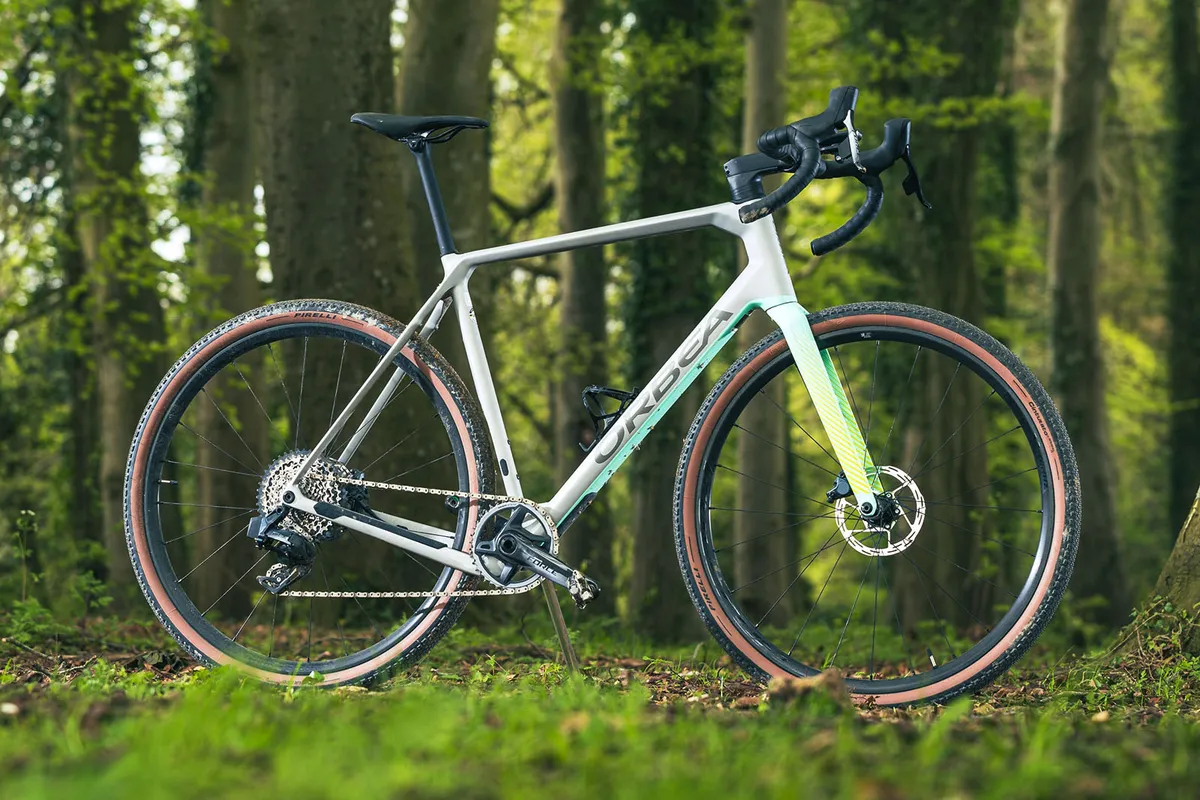
The frame is suspension-fork corrected thanks to the long 390mm Terra carbon fork, and with a removable front derailleur mount it’s easy to run either 2x or 1x.
Up-front, the Terra uses Orbea’s clever internal-routing design – known as ‘OC ICR’. This enables the use of oversized 1 1/2in headset bearings, yet uses a standard 1 1/8in round tapered steerer.
That means you can run any stem and gravel bar combo you like too, providing you use Orbea’s adaptor for the oversized headset spacers. Handily, this is included with the bike.
The standard round 27.2mm-diameter seatpost also enables you to run a wide range of seatposts, and opens up the possibility of using one of the best gravel bike dropper posts (there’s internal routing for that too).
The frame features threaded bosses on the dropouts for full-length mudguards. For big mile munchers, the Terra features triple bottle cage mounts.
Orbea has made good use of the oversized down tube by including a storage box (called ‘LOCKR’), with a lockable door underneath the down tube bottle cage bosses.
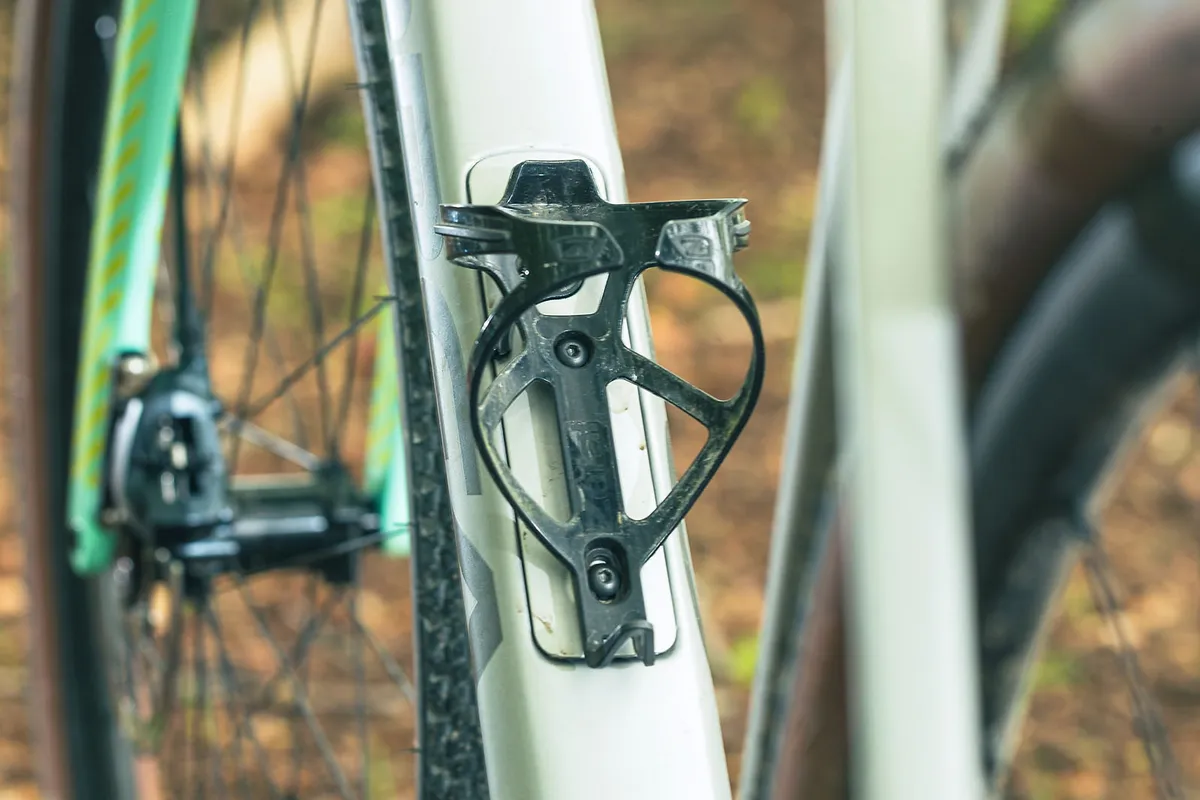
Inside, there's room to store a spare tube and multi-tool, plus a pump or CO2 cartridge. All are secured with the included pouch and neoprene wrap.
The bottom bracket shell has a further covered port that is designed to hold a Shimano EW-RS910 Di2 junction box and charge port (for GRX Di2 and 11-speed Di2 systems).
This means you don’t have to route a cable all the way to the bar-end.
The Terra fork has a very defined kink that shifts the fork crown forward. Orbea claims this design effectively extends the length of the fork to better dissipate vibrations and absorb impacts from bumps and ruts.
The compact frame design exposes plenty of the seatpost, which acts to help it flex. Orbea also claims the carbon layup in the seat tube and bottom bracket joint has been specially developed to improve compliance at the rear end.
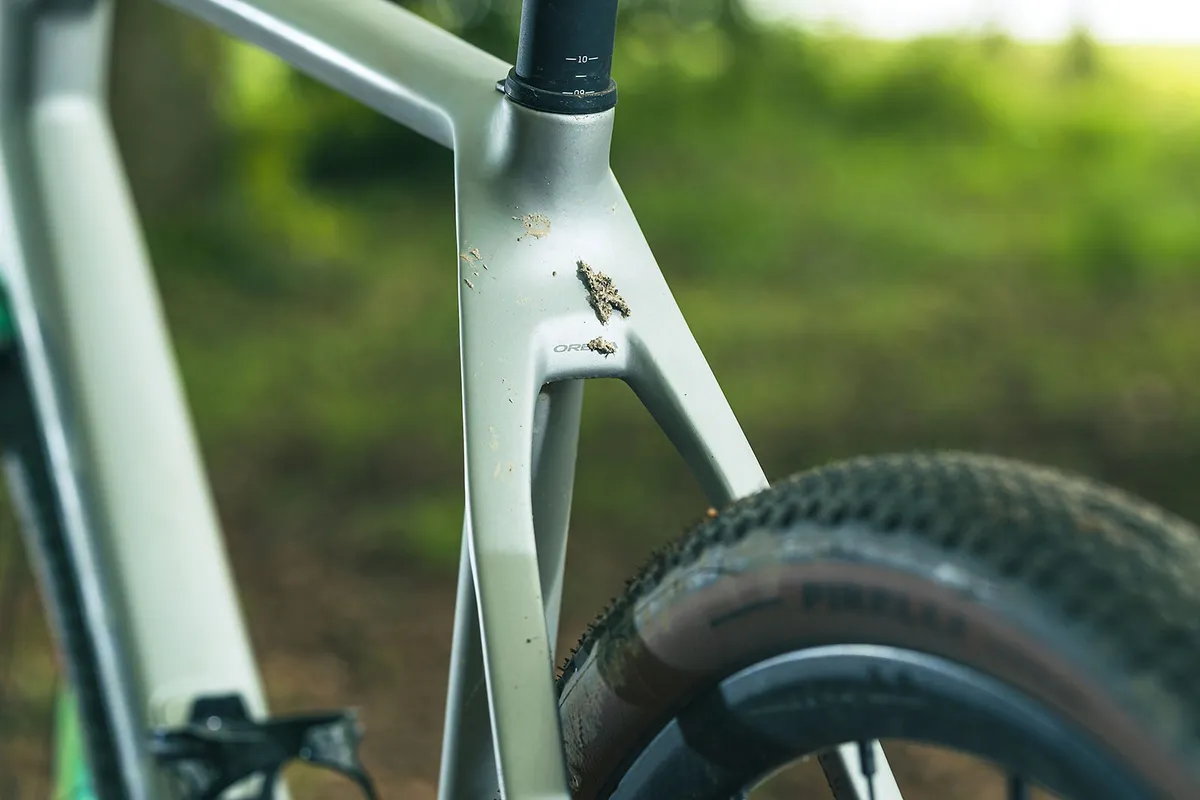
The rear end is kept short, with its chainstays just 420mm long. This is markedly compact for a bike that can accommodate 700 x 45c and 650 x 50b tyres.
The chainstays are asymmetric, where the driveside stay is dropped compared to the non-driveside. Orbea says this enables the Terra to run a 2x crankset without ruining the chainline (the Terra can use up to a road-compact 34-tooth inner ring in 2x trim).
3T and Open pioneered this solution as a way to enable gravel bikes to run mountain bike-sized tyres without having to resort to widening the Q-factor (the distance between the pedal centres on your cranks) most road riders are used to.
Orbea Terra M21e Team 1X geometry
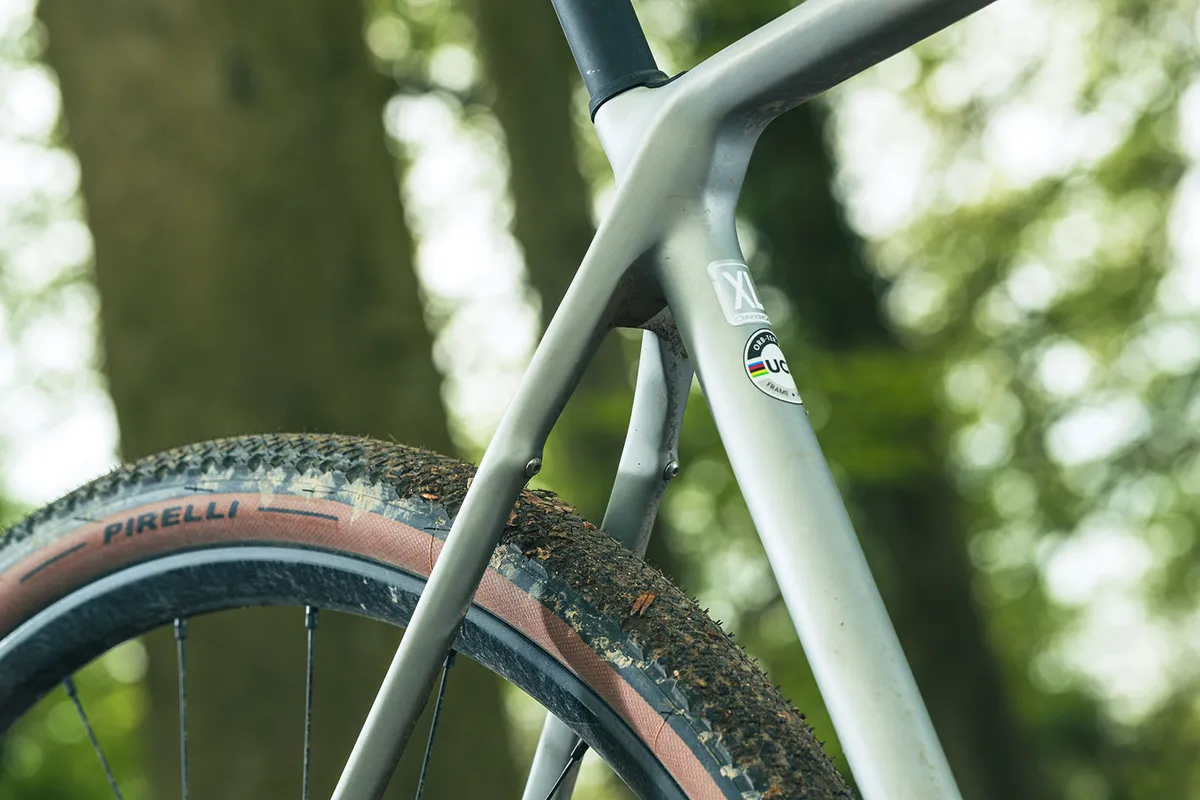
Orbea’s take on gravel geometry is halfway between a fast gravel bike such as the Cervélo Aspero and more mountain-bike inspired designs, as embodied by Merida Silex.
In simple terms, Orbea has lengthened the reach of the bike compared to the old, adapted road endurance geometry.
My XL test bike has a reach of 402mm, while the equivalent-sized Avant endurance bike has a 395mm reach.
The head angle is 71.5 degrees – steeper than the old Terra – and is combined with a 100mm stem to keep the steering keenly quick.
The sharp steering is enhanced by the short trail on the fork too, which is optimised for every size. Trail is also affected by tyre choice, and Orbea states trail figures for both a 30mm tyre and a 40mm tyre to give some idea of where your ultimate gravel tyre choice will put you.
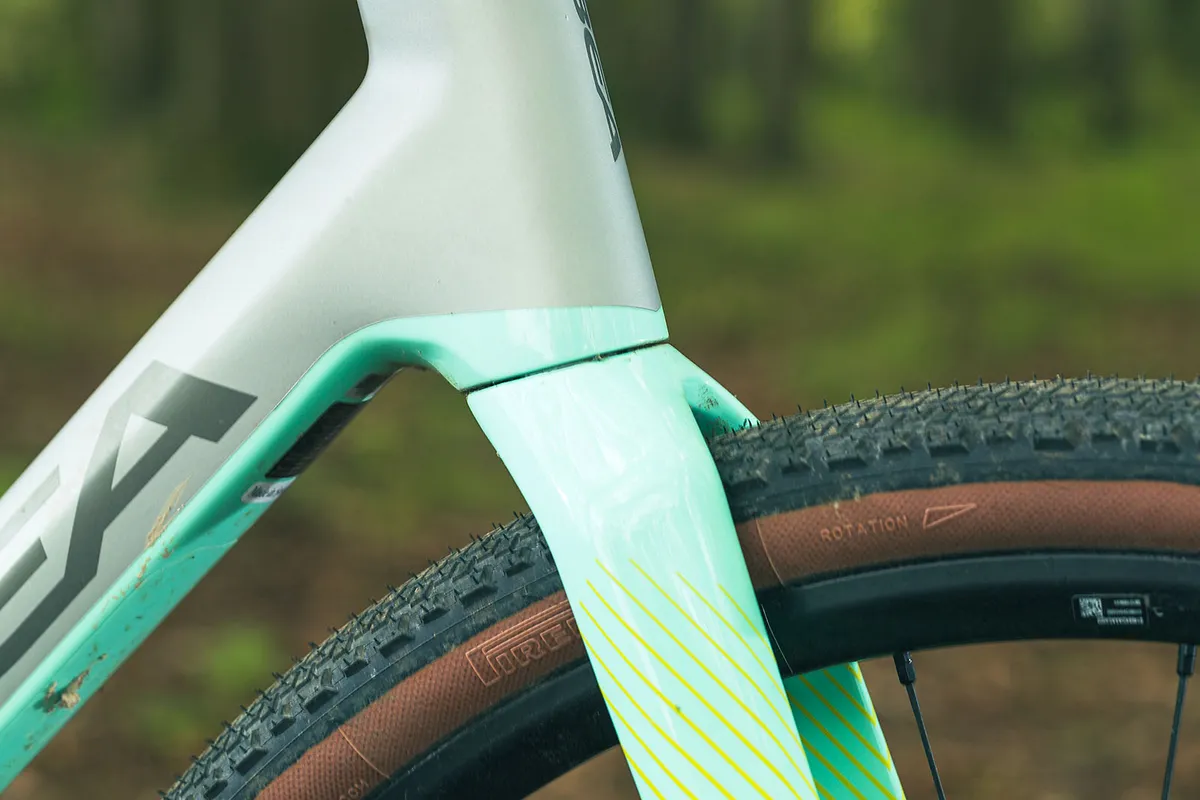
The bottom bracket is low slung to compensate for the taller ride you’ll get using larger-volume gravel tyres, while it should help the bike feel more planted on descents.
While a generous wheelbase is present to help the bike feel stable at speed, the compact chainstays are designed to help it feel agile when the path gets technical.
A road-steep seat angle of 73 degrees (on my size-XL bike), combined with a zero-offset seatpost, is intended to pitch you over the cranks for efficient power delivery.
| | S | XS | M | L | XL | XXL |
|---|---|---|---|---|---|---|
| Seat angle (degrees) | 74 | 74 | 73.5 | 73.5 | 73 | 73 |
| Head angle (degrees) | 70 | 70.5 | 71 | 71 | 71.5 | 72 |
| Chainstay (mm) | 420 | 420 | 420 | 420 | 420 | 420 |
| Seat tube (mm) | 405 | 438 | 471 | 504 | 537 | 570 |
| Top tube (mm) | 536 | 539 | 558 | 570 | 590 | 603 |
| Head tube (mm) | 110 | 131 | 152 | 178 | 199 | 220 |
| Trail (mm) | 71 | 68 | 64 | 64 | 61 | 58 |
| Bottom bracket drop (mm) | 78 | 78 | 78 | 76 | 76 | 76 |
| Bottom bracket height (mm) | 278 | 278 | 278 | 280 | 280 | 280 |
| Wheelbase (mm) | 1,009 | 1,019 | 1,029 | 1,044 | 1,053 | 1,062 |
| Standover (mm) | 727 | 755 | 783 | 813 | 840 | 868 |
| Stack (mm) | 526 | 548 | 570 | 592 | 614 | 636 |
| Reach (mm) | 375 | 382 | 389 | 395 | 402 | 409 |
Orbea Terra M21e Team 1X build
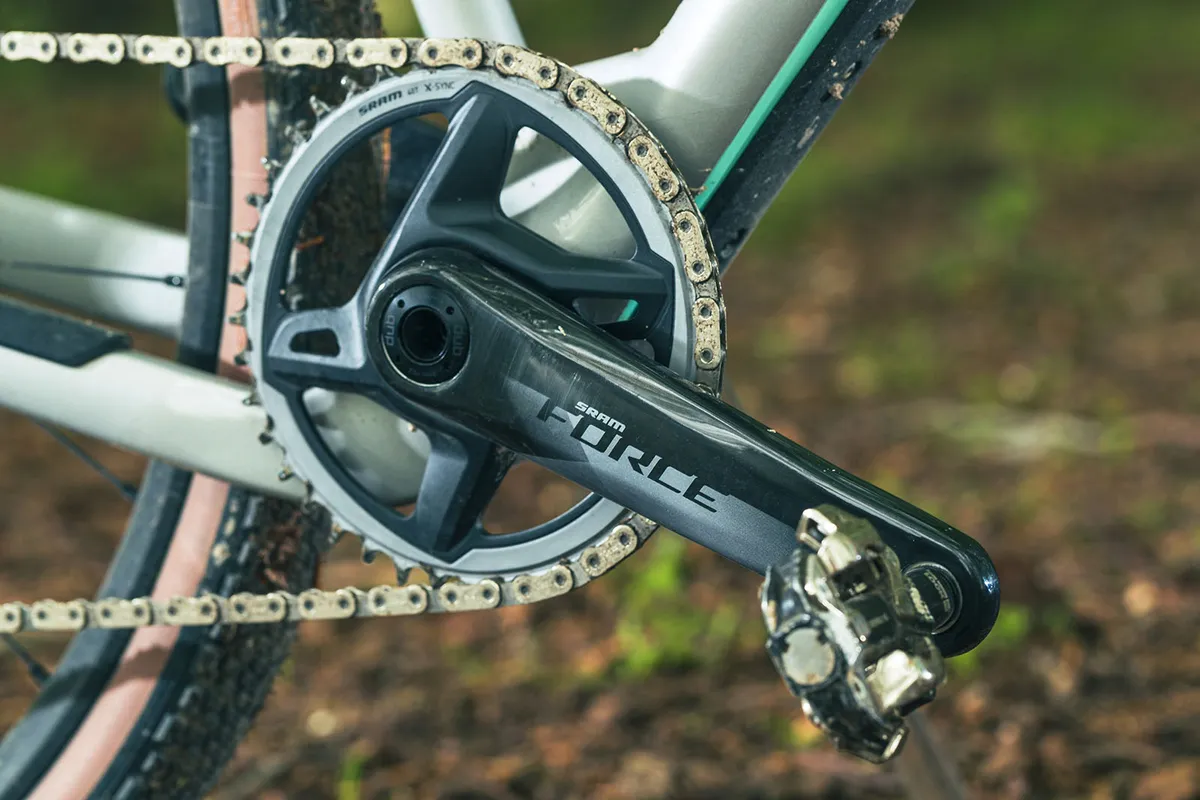
The Terra M21e Team 1X build combines quality own-brand components with recognisable third-party kit.
The M21e is built around a SRAM Force AXS XPLR groupset. A 40-tooth direct-mount crankset is paired with a wide-ranging 10-44 tooth cassette.
The Force XPLR here is the previous generation rather than the new 2023 iteration, but it’s nevertheless a very good drivetrain.
Fulcrum provides the rolling stock with its Rapid Red 500 DB 700c gravel wheels.
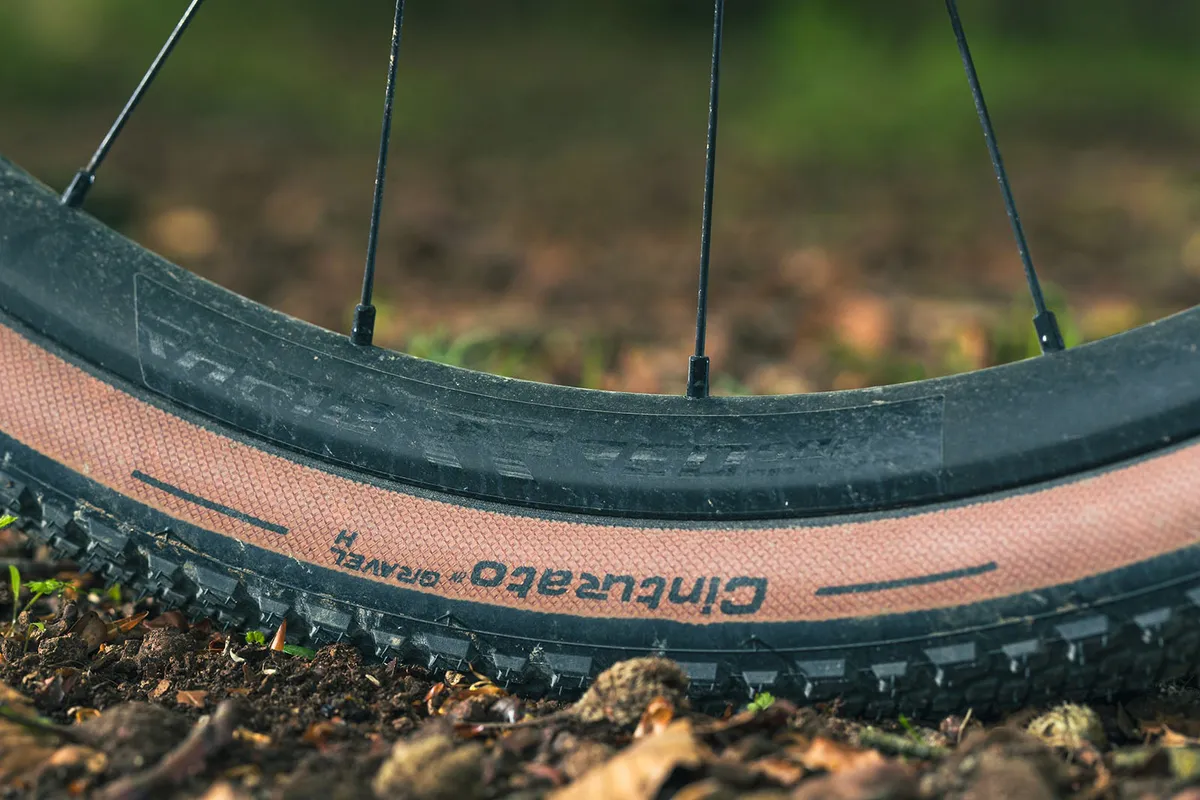
This alloy wheel combines a shallow 24mm-deep, 28mm-wide (external) rim. The inner channel is 23mm wide.
Fulcrum states the tubeless-ready rims are designed to work with 30-46c tyres.
These lace to Fulcrum hubs via 24 stainless straight-pull spokes per wheel. The freehub has a 10-degree engagement, which translates to a quick pickup, ideal for more technical trails at the sharper end of gravel riding.
At 1,760g a pair, the wheelset doesn’t break any weight records. However, it’s worth noting it’s effectively the same as the aftermarket Rapid Red 5 DB, but available in a custom finish for bike brands (here an understated all-black). That retails at £389.99, which positions it in the mid-range of alloy wheel offerings.
The Fulcrums are wrapped in Pirelli’s 40c version of the tubeless-compatible Cinturato Gravel H tyre.
At the front, Orbea’s very neat OC ICR stem is understated and integrates smoothly with the headset spacers, fully hiding both front and rear brake hoses.
Orbea also throws in an out-front GPS mount.
This clamps to an Easton EC90 AX carbon gravel bar, which at 205g (42cm size centre to centre) is very light. It retails for £299.99 on its own, so it’s impressive that Orbea has included it here as a standard.
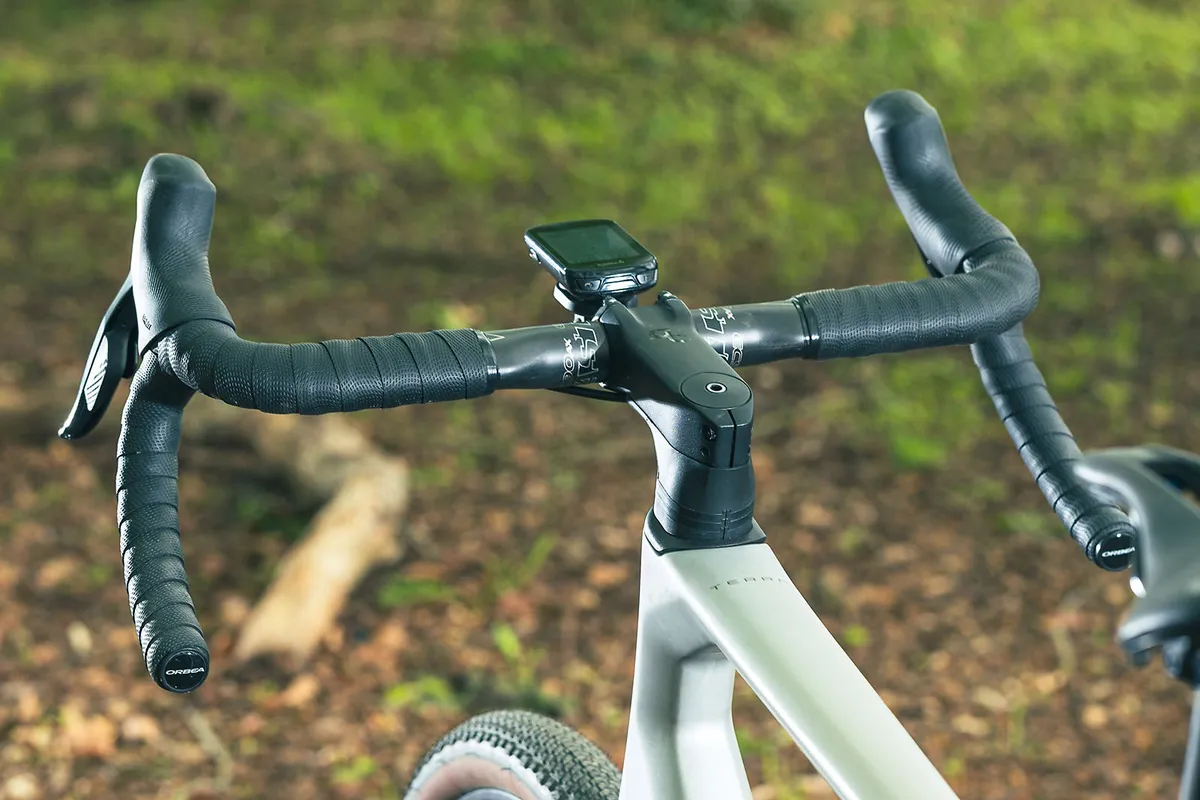
Orbea supplies its OC carbon seatpost, topped by Selle Italia’s Boost SLR saddle. The saddle is a $75/£59/€65 upgrade, over the standard-specification Prologo Dimension.
At £5,358 as specced, the Terra M21e Team represents good value compared to similar-specification bikes from its competition.
The Specialized Crux Expert (£6,300) and the Giant Revolt X Advanced Pro (£5,499) both feature lower-tier SRAM Rival AXS XPLR groupsets, with largely comparable finishing kits.
Orbea Terra M21e Team 1X ride impressions
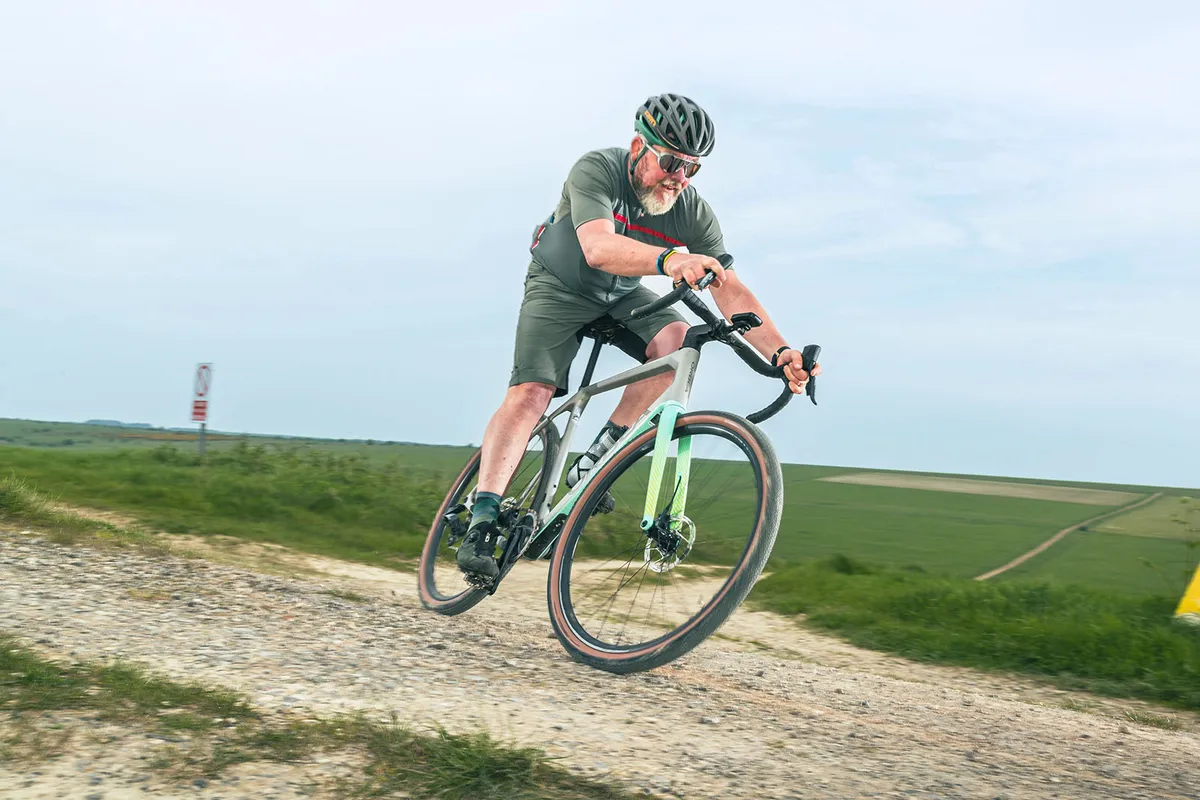
In short, Orbea has got the Terra well sorted.
The bike has a great duality in its ride. On tarmac, between trails, it feels quite sparky and faster than you’d imagine a bike shod with large 40c tyres would.
Certainly, it feels better on the road than more ‘extreme’ gravel designs such as Surly’s Grappler or the Ridley Kanzo Adventure. The low bottom bracket adds stability in corners, countering the squish of the fat rubber well.
It’s light enough to not be a burden on long road climbs and the frame's solid feel through the drivetrain means it picks up quickly and responds in kind to out-of-the-saddle efforts.
Steer the Terra onto its natural off-road habitat and it shines even brighter – it never feels anything less than composed on the roughest of surfaces.
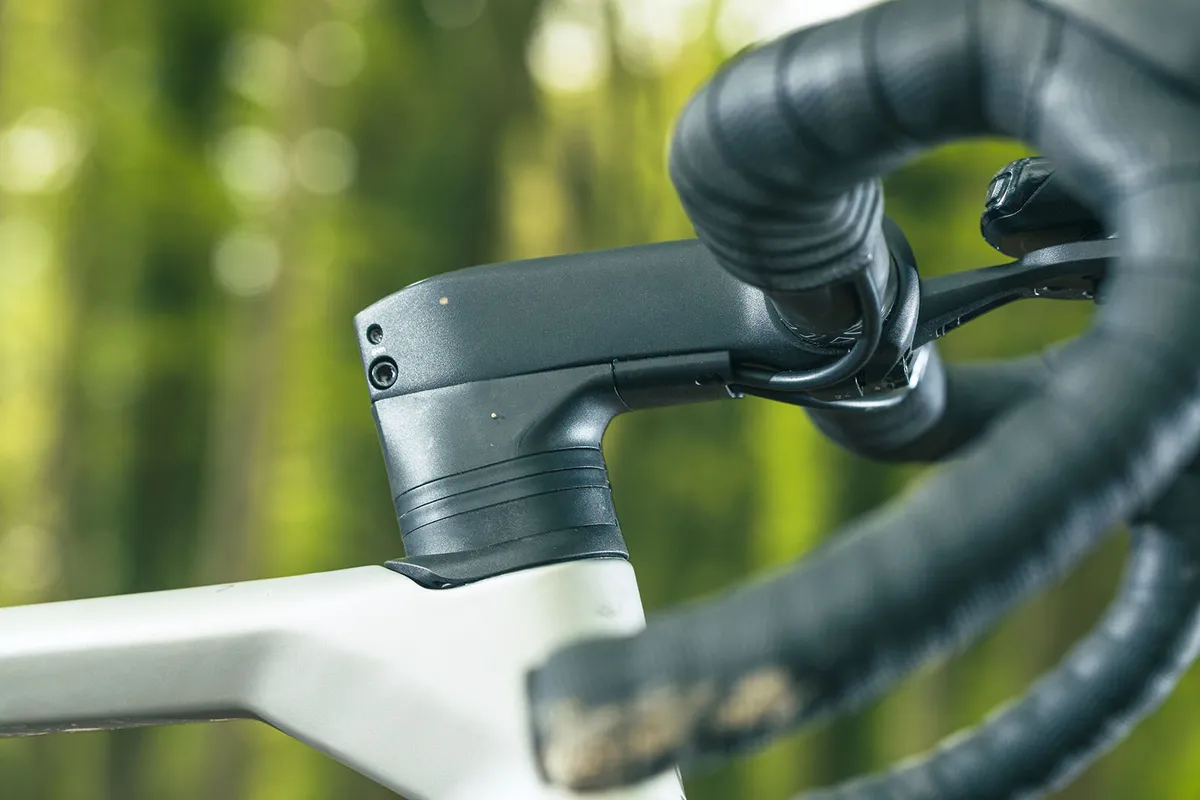
The middleweight alloy wheels could have been the spanner in the works for the Terra’s ride, but they performed admirably.
Switching to a lighter set of wheels would make a difference to overall performance, but even so the Terra doesn’t feel hefty at all.
Some gravel bikes with a ‘race’ edge come with smaller tyres (such as the Crux Expert), but I’d much rather stick with bigger volumes for improved comfort and cushioning.
The Pirelli Cinturato H is the Italian tyre brand’s design for harder conditions, so probably not the best match for wet and cold weather.
Despite this, I came away impressed. The short shoulder knobs on the Cinturato’s tread pattern cut into soggy conditions remarkably well.
Only on sections where the trail got boggy did the grip fall away and the rear tyre spin out. Occasionally, the front tyre also wandered wide, understeering as it grappled for traction.
Thankfully, it shed claggy clay rapidly once I got to firmer ground, while a more mud-ready tyre is just a switch away. On less technical terrain, the Cinturato H impressed.
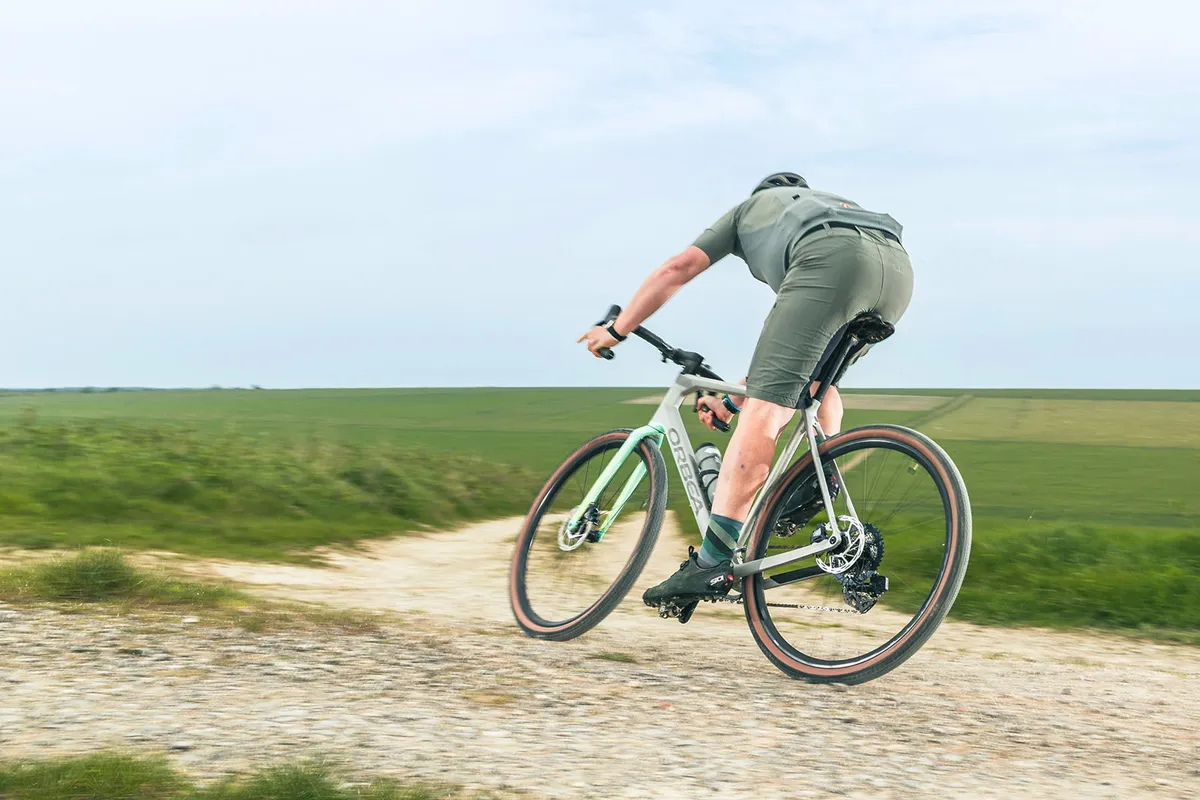
The ride is comfortable on chattery surfaces – the fork does a great job of nullifying bumps and the bar dulls vibrations too.
It’s matched by a back end that does an equally good job of minimising the sort of vibrations that sap your energy and bring on full-body fatigue.
The carbon post has plenty of exposed shaft to assist compliance, while the Selle Italia SLR Boost saddle suited me perfectly. Choosing a bike saddle is always very personal, and here you have lots of options through Orbea’s custom programme.
The Terra is also a great companion on more technical terrain. On a few sojourns onto forest singletrack trails, the frame demonstrated its ability to deal with technicalities, to the point where I thought it’d truly benefit from a dropper post to really push the boundaries of its capability.
Orbea Terra M21e Team 1X bottom line
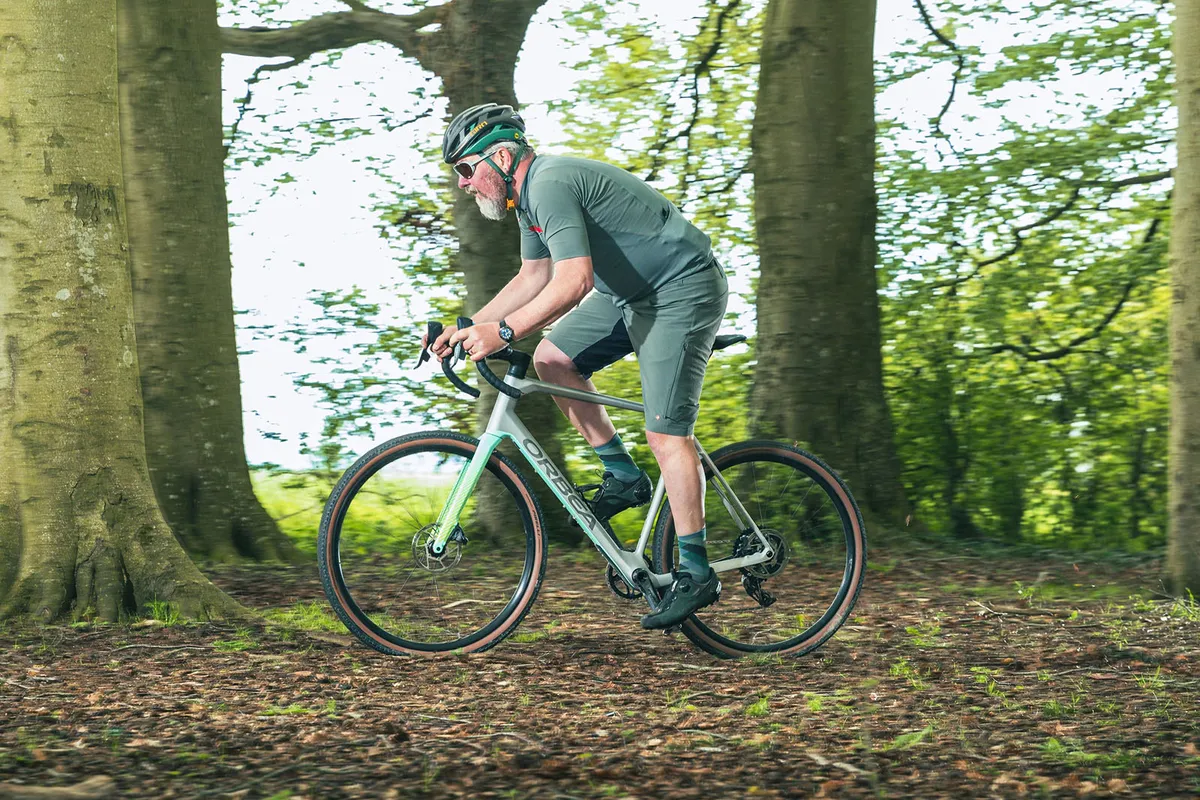
The Terra is everything all-round modern gravel bikes should be.
It's versatile with plenty of fittings to appeal to expedition riders, but with a ride and geometry that will appeal to day riders who like to venture onto singletrack and enjoy technically challenging rides.
It's also comfortably quick enough for gravel racing and, although it's not cheap, its specification beats some key similarly priced competition.
The Terra M21e Team 1X would benefit from lighter, faster wheels, while the tyres need to be selected to suit the conditions (as usual), but those are the only notable criticisms I can level at it.
Product
| Brand | Orbea |
| Price | €5364.00, £5358.00, $5874.00 |
| Weight | 9.10kg |
Features
| Fork | Full carbon |
| Stem | OC Road performance RP10 |
| Chain | Sram Force 12 speed |
| Frame | OMR Carbon |
| Tyres | Pirelli Cinturato Gravel H 700 x 40c TLR |
| Brakes | Sram Force AXS |
| Cranks | Sram Force 1 DM Dub 40t |
| Saddle | Selle Italia SLR Boost manganese rails |
| Wheels | Fulcrum Rapid Red 500 DB |
| Headset | FSA 1-1.5” integrated alloy cup |
| Shifter | Sram Force AXS |
| Cassette | Sram XD1271 10-44t 12 speed |
| Seatpost | OC Performance XP10 Carbon 27.2 |
| Handlebar | Easton EC90 AX Carbon 16-degree flare internal routing |
| Available sizes | XS, S, M, L, XL, XXL |
| Rear derailleur | Sram Force XPLR AXS |
| Features | Accessories: Storage toolbag bag and neoprene toolbag (for down tube storage box), OC out-front mount |
